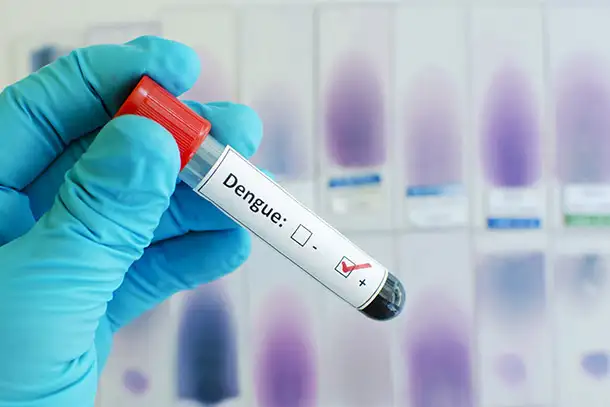
The Hawaiian health department is currently investigating a cluster of cases of the potentially deadly dengue fever on Hawaii Island.
According to the health department there have been 92 confirmed cases of dengue since September. Of those cases 79 of the victims have been Hawaii residents and 13 have been visitors. Seventy of the cases have been adults and twenty-two have been children.
There have been no deaths reported from the tropical disease so far this fall.
Officials with the CDC and tropical disease experts claim that the recent outbreak is not a reason for anyone to cancel their travel plans.
“While dengue is present on the Big Island, there are a variety of ways to avoid the disease and risk can be minimized through repellents and other means,” Vicki Sowards, the director of nursing resources with travel medicine provider Passport Health USA explained.
The fever is not spread by contact with an infected person, rather through the bite of an infected mosquito.
The best way to protect yourself from mosquitoes is to use a repellent with 20-30% DEET. This should be put on AFTER any sunscreen or makeup products and used 20 minutes before possible exposure. Long sleeves, pants and closed toes shoes also offer protection,” Sowards explains. “A product, Premetherin, can be sprayed onto outer clothing prior to travel. It offers repellent protection for 6 weeks or 6 washings. It is recommended for outer night clothes, as the mosquitos may be attracted to the lights.”
Sowards also advises travelers to try to stay in air-conditioned hotels.
“If there is no air conditioning, be sure there are no holes in the screens and that windows are only open if there are screens in good repair,” she says.
Last week the National Guard began assisting the health department by flying mosquito sprayers from Oahu to the Big Island.
Here are the things the Hawaii health department wants you to know about the current dengue fever outbreak.
What Is Dengue Fever?
“Dengue fever is a viral illness spread by mosquitoes. The disease occurs mainly in tropical Asia, Africa, the Caribbean and the South Pacific. It is most common during the rainy season in areas infested with infected mosquitoes. Sometimes, persons arriving from other countries may enter the United States with dengue fever and infect local mosquitoes, as happened in Hawaii in 2001.
What Are the Symptoms of Dengue Fever?
“The symptoms of dengue fever include sudden onset of fever, severe headaches, eye, joint, and muscle pain, and rash. The rash typically appears on the hands, arms, legs and feet 3 to 4 days after the fever begins. Minor bleeding problems can also occur.”
RELATED: Mosquitos and West Nile Virus—Your Guide to Staying Safe
Where on the Big Island Are the Cases Located?
“The investigation is still underway, and the Department of Health (DOH) is still investigating possible areas where cases may have been exposed to infected mosquitoes. Current investigations have identified South Kona (in particular Hookena and Honaunau) as an area of particular concern, but the entire island is considered to be at risk.”
How Many Cases Have There Been?
“The investigation is still ongoing. We are still actively seeking cases, following up on reported illnesses, so the number of cases continues to change. Visit the DOH Dengue Outbreak 2015 webpage for updates and information.”
What Type of Dengue Viruses Have Been Identified in This Outbreak?
“There are four closely related dengue viruses (DENV 1, DENV 2, DENV 3, and DENV 4). The current 2015 Hawaii Island outbreak involves DENV 1 serotype virus.”
RELATED: 7 Things That Can Protect You From Norovirus on a Ship
What Is the Treatment for Dengue Fever?
“There is no specific treatment for dengue fever. Bed rest and acetaminophen (Tylenol) to treat fever and pain are recommended. Aspirin and NSAIDS (ibuprofen, naproxen) are not recommended as they can make bleeding problems worse. There is currently no vaccine for dengue fever.”
For more information you can call Aloha United Way 2-1-1.
To report a suspect case call 808-974-6001 (East Hawaii) or 808-322-4880 (West Hawaii).
—Jo Piazza
This article was originally published by Yahoo! Travel under the headline Potentially Deadly Virus Hits Hawaii—Everything You Need to Know. It is reprinted here with permission.
More from Yahoo! Travel:
- Molokai: The Last Truly Unspoiled Hawaiian Island
- 18 Jobs That Let You Travel the World
- Easy Tips for Nervous Fliers: How to Keep Calm on a Plane
(Photo: Thinkstock/iStock)
We hand-pick everything we recommend and select items through testing and reviews. Some products are sent to us free of charge with no incentive to offer a favorable review. We offer our unbiased opinions and do not accept compensation to review products. All items are in stock and prices are accurate at the time of publication. If you buy something through our links, we may earn a commission.
Related
Top Fares From
Today's Top Travel Deals
Brought to you by ShermansTravel
Kenya: 14-Night Tour, Incl. Tanzania &...
smarTours
 vacation
$7125+
vacation
$7125+
7-Night Bermuda Cruise From Round-Trip Cruise...
Norwegian Cruise Line
 cruise
$1036+
cruise
$1036+
Ohio: Daily Car Rentals from Cincinnati
85OFF.com
 Car Rental
$19+
Car Rental
$19+



